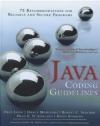Java Coding Guidelines
David Svoboda, Dean Sutherland, Robert Seacord
Java Coding Guidelines
David Svoboda, Dean Sutherland, Robert Seacord
- Producent: Addison Wesley Publishing Company
- Rok produkcji: 2013
- ISBN: 9780321933157
- Ilość stron: 304
- Oprawa: Miękka
Niedostępna
Opis: Java Coding Guidelines - David Svoboda, Dean Sutherland, Robert Seacord
"A must-read for all Java developers...Every developer has a responsibility to author code that is free of significant security vulnerabilities. This book provides realistic guidance to help Java developers implement desired functionality with security, reliability, and maintainability goals in mind." -Mary Ann Davidson, Chief Security Officer, Oracle Corporation Organizations worldwide rely on Java code to perform mission-critical tasks, and therefore that code must be reliable, robust, fast, maintainable, and secure. Java(TM) Coding Guidelines brings together expert guidelines, recommendations, and code examples to help you meet these demands. Written by the same team that brought you The CERT(R) Oracle (R) Secure Coding Standard for Java(TM), this guide extends that previous work's expert security advice to address many additional quality attributes. You'll find 75 guidelines, each presented consistently and intuitively. For each guideline, conformance requirements are specified; for most, noncompliant code examples and compliant solutions are also offered. The authors explain when to apply each guideline and provide references to even more detailed information. Reflecting pioneering research on Java security, Java(TM) Coding Guidelines offers updated techniques for protecting against both deliberate attacks and other unexpected events. You'll find best practices for improving code reliability and clarity, and a full chapter exposing common misunderstandings that lead to suboptimal code. With a Foreword by James A. Gosling, Father of the Java Programming Language "This set of Java(TM) Coding Guidelines, a follow-on to the earlier The CERT(R) Oracle Secure Coding Standard for Java(TM), is invaluable. This book could almost be retitled Reliable Java(TM) Coding Guidelines. One of the things that has struck me over the years is the interplay between reliability and security. There are all sorts of explicit security tools-cryptography, authentication, and others-but most break-ins are exploitations of bugs: coding that was badly done or that was insufficiently defensive. Building a reliable system is, in many ways, equivalent to building a secure system. The work you do in reliability pays off in security, and vice versa. "This book highlights the fact that security is not a feature; it is an attitude toward taking due care at every point. It should be a continuous part of every software engineer's design thought process. It is organized around a list of guidelines. The meat of the book is the subtlety behind them. For example, "Store passwords using a hash function" appears to be a very basic and obvious point, and yet there are regular news articles about major data breaches just because some software engineer wasn't thinking. Getting it right is tricky: there are a lot of details for the devil to hide in. This book is full of excellent guidance for dealing with those details." -James A. GoslingForeword xi Preface xiii Acknowledgments xix About the Authors xxi Chapter 1: Security 1 1. Limit the lifetime of sensitive data 2 2. Do not store unencrypted sensitive information on the client side 5 3. Provide sensitive mutable classes with unmodifiable wrappers 9 4. Ensure that security-sensitive methods are called with validated arguments 11 5. Prevent arbitrary file upload 13 6. Properly encode or escape output 16 7. Prevent code injection 20 8. Prevent XPath injection 23 9. Prevent LDAP injection 27 10. Do not use the clone() method to copy untrusted method parameters 31 11. Do not use Object.equals() to compare cryptographic keys 34 12. Do not use insecure or weak cryptographic algorithms 36 13. Store passwords using a hash function 37 14. Ensure that SecureRandom is properly seeded 42 15. Do not rely on methods that can be overridden by untrusted code 44 16. Avoid granting excess privileges 50 17. Minimize privileged code 54 18. Do not expose methods that use reduced-security checks to untrusted code 56 19. Define custom security permissions for fine-grained security 64 20. Create a secure sandbox using a security manager 67 21. Do not let untrusted code misuse privileges of callback methods 72 Chapter 2: Defensive Programming 79 22. Minimize the scope of variables 80 23. Minimize the scope of the @SuppressWarnings annotation 82 24. Minimize the accessibility of classes and their members 84 25. Document thread-safety and use annotations where applicable 89 26. Always provide feedback about the resulting value of a method 96 27. Identify files using multiple file attributes 99 28. Do not attach significance to the ordinal associated with an enum 106 29. Be aware of numeric promotion behavior 108 30. Enable compile-time type checking of variable arity parameter types 112 31. Do not apply public final to constants whose value might change in later releases 115 32. Avoid cyclic dependencies between packages 118 33. Prefer user-defined exceptions over more general exception types 121 34. Try to gracefully recover from system errors 123 35. Carefully design interfaces before releasing them 125 36. Write garbage collection-friendly code 128 Chapter 3: Reliability 131 37. Do not shadow or obscure identifiers in subscopes 132 38. Do not declare more than one variable per declaration 134 39. Use meaningful symbolic constants to represent literal values in program logic 138 40. Properly encode relationships in constant definitions 142 41. Return an empty array or collection instead of a null value for methods that return an array or collection 143 42. Use exceptions only for exceptional conditions 146 43. Use a try-with-resources statement to safely handle closeable resources 148 44. Do not use assertions to verify the absence of runtime errors 151 45. Use the same type for the second and third operands in conditional expressions 153 46. Do not serialize direct handles to system resources 157 47. Prefer using iterators over enumerations 159 48. Do not use direct buffers for short-lived, infrequently used objects 162 49. Remove short-lived objects from long-lived container objects 163 Chapter 4: Program Understandability 167 50. Be careful using visually misleading identifiers and literals 167 51. Avoid ambiguous overloading of variable arity methods 171 52. Avoid in-band error indicators 173 53. Do not perform assignments in conditional expressions 175 54. Use braces for the body of an if, for, or while statement 178 55. Do not place a semicolon immediately following an if, for, or while condition 180 56. Finish every set of statements associated with a case label with a break statement 181 57. Avoid inadvertent wrapping of loop counters 183 58. Use parentheses for precedence of operation 186 59. Do not make assumptions about file creation 189 60. Convert integers to floating-point for floating-point operations 191 61. Ensure that the clone() method calls super.clone() 194 62. Use comments consistently and in a readable fashion 196 63. Detect and remove superfluous code and values 198 64. Strive for logical completeness 202 65. Avoid ambiguous or confusing uses of overloading 205 Chapter 5: Programmer Misconceptions 209 66. Do not assume that declaring a reference volatile guarantees safe publication of the members of the referenced object 209 67. Do not assume that the sleep(), yield(), or getState() methods provide synchronization semantics 216 68. Do not assume that the remainder operator always returns a nonnegative result for integral operands 220 69. Do not confuse abstract object equality with reference equality 222 70. Understand the differences between bitwise and logical operators 225 71. Understand how escape characters are interpreted when strings are loaded 228 72. Do not use overloaded methods to differentiate between runtime types 231 73. Never confuse the immutability of a reference with that of the referenced object 234 74. Use the serialization methods writeUnshared() and readUnshared() with care 239 75. Do not attempt to help the garbage collector by setting local reference variables to null 243 Appendix A: Android 245 Glossary 249 References 255 Index 263
Szczegóły: Java Coding Guidelines - David Svoboda, Dean Sutherland, Robert Seacord
Tytuł: Java Coding Guidelines
Autor: David Svoboda, Dean Sutherland, Robert Seacord
Producent: Addison Wesley Publishing Company
ISBN: 9780321933157
Rok produkcji: 2013
Ilość stron: 304
Oprawa: Miękka
Waga: 0.48 kg






























